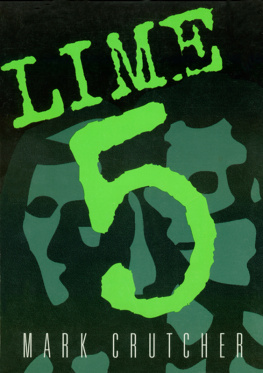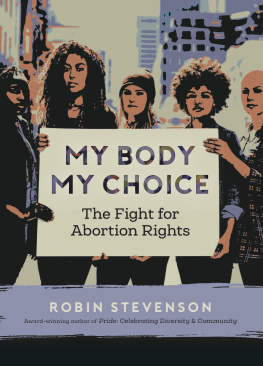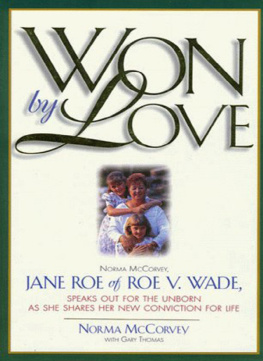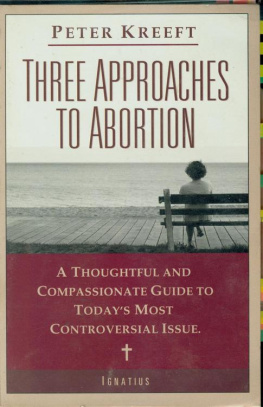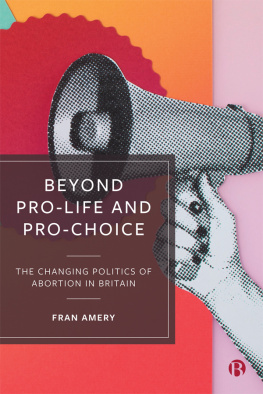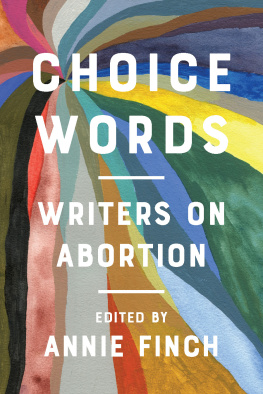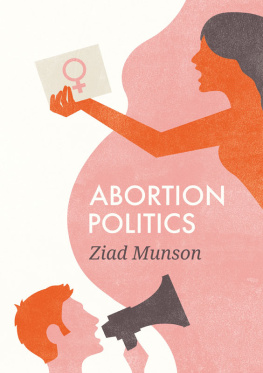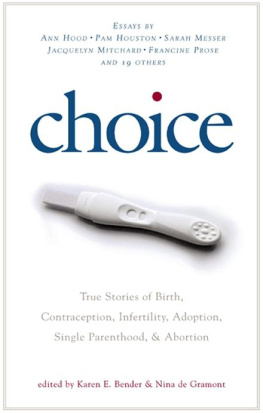Library of Congress Cataloging-in-Publication Data
Weingarten, Karen, 1980
Abortion in the American Imagination : Before Life and Choice, 18801940 / Karen Weingarten.
pages cm. (American Literatures Initiative)
Includes bibliographical references and index.
ISBN 978-0-8135-6530-9 (hardback) ISBN 978-0-8135-6529-3 (pbk.) ISBN 978-0-8135-6539-2 (e-book)
1. American literatureHistory and criticism. 2. Abortion in literature. I. Title.
PS169.A28W45 2014
810.9355dc23 2013040900
A British Cataloging-in-Publication record for this book is available from the British Library.
Copyright 2014 by Karen Weingarten
All rights reserved
No part of this book may be reproduced or utilized in any form or by any means, electronic or mechanical, or by any information storage and retrieval system, without written permission from the publisher. Please contact Rutgers University Press, 106 Somerset Street, New Brunswick, NJ 08901. The only exception to this prohibition is fair use as defined by U.S. copyright law.
Visit our website: http://rutgerspress.rutgers.edu
A book in the American Literatures Initiative (ALI), a collaborative publishing project of NYU Press, Fordham University Press, Rutgers University Press, Temple University Press, and the University of Virginia Press. The Initiative is supported by The Andrew W. Mellon Foundation. For more information, please visit www.americanliteratures.org.
For CJF
The support of many colleagues and friends made this book possible, and I am grateful for their belief in me and my work. I owe particular thanks to the institutional support I received from Queens College, City University of New York, and from the PSC-CUNY Research Foundation, whose grants made much of my summer work and travel possible. I am also thankful to the Woodrow Wilson Womens Studies Fellowship, which funded this project at an early stage. I hope the fellowship will be available to many more young scholars in women, gender, and sexuality studies. I am grateful for the help of several archives and libraries, including the Wertheim Room at the New York Public Library and especially the support of Jay Barksdale, the Sophia Smith Archives at Smith College, the UCLA film and television archive, the Margaret Herrick Library at the Academy of Motion Picture Arts and Sciences, the Performing Arts Library at the New York Public Library, and the library at the New York Academy of Medicine. An earlier version of chapter 2, The Inadvertent Alliance of Anthony Comstock and Margaret Sanger, was published in Feminist Formations 22, no. 2 (Summer 2010): 4259, and a shorter version of chapter 3 was published as Bad Girls and Biopolitics: Abortion, Popular Fiction, and Population Control in Literature and Medicine 29, no. 1 (Spring 2011): 81103. My expanded discussion of abortion rhetoric in Edith Whartons Summer, which I briefly touch on here in chapter 1, was published as Between the Town and the Mountain: Abortion and the Politics of Life in Edith Whartons Summer in Canadian Review of American Studies 40, no. 3 (Autumn 2010): 35172. The editors of all three journals and the anonymous reviewers gave me invaluable advice and insight that ultimately helped shaped the entire manuscript. They were examples of how peer review works at its very best.
Ultimately, I owe the biggest thanks to individual people who guided me along the way. I couldnt ask for better colleagues and friends at Queens College. Amy Wan, Gloria Fisk, Kevin Ferguson, Jason Tougaw, Caroline Hong, Carrie Hintz, Talia Schaffer, Steven Kruger, and Glenn Burger either read pieces of the manuscript or gave me invaluable advice along the way. Ive also been fortunate to work with Andrea Walkden, Annmarie Drury, Sian Silyn Roberts, Veronica Schanoes, Seo-Young Chu, Nicole Cooley, Kimiko Hahn, Ryan Black, John Weir, Harold Schechter, Hugh English, and Miles Grier at Queens College. I am grateful to have such a welcoming and supportive work environment. Outside of Queens, I cant say enough to express my gratitude and appreciation for the members of my writing group, Lauren Klein, Sarah Blackwood, and Kyla Schuller. I could not wish for a smarter and more dedicated group of writing friends. I also owe many thanks to David Kazanjian, Hildegarde Hoeller, and David Reynolds for helping me at various stages along the way. My dear friend and colleague Diana Colbert isnt alive to see this book in print, but my conversations with her echo in its pages. My community of academic friends, now scattered across North America, has also been invaluable to this process. There are so many people to thank, but in particular Karen Weiser, Lily Saint, Heather Latimer, and Rebekah Sheldon are models for me of intelligence, kindness, and political commitment to making the world a smarter, more thoughtful place. Dale Bauers and the anonymous readers comments on the manuscript in its later stages were also invaluable and made this book better. Katie Keeran at Rutgers University Press has been a model editor. I owe her innumerable thanks for bringing this project to fruition. Finally, at the end stages of this project, where detail matters, I am grateful for the careful attention provided by Tim Roberts and Carol Sickman-Garner.
My family, spread across the Atlantic, on the other coast, and up north in Canada, has cheered me on and only occasionally pestered me with the question, So when will that book be done? I am so grateful for their love and support. I also owe so much to many friends who cheered me up and cheered me on. Joanna Sondheim, Laura Davis, Tali Horowitz, Olivia deBree, MK Babcock, Arielle DePaolo, Solvej Schou, Lilla Tke, and Aman Gill deserve a special thank you for their love and support. For Ansel I have a special thank you for helping focus and distract me in equal measures. Finally and most importantly, I cannot thank Corey Frost enough. With wisdom, love, and amazing editorial skills, he talked me through difficult moments in this project and always believed in me. I could not ask for a better partner and friend.
It isno wonder that the debate about abortion should refuse to settle into a single voice.
Barbara Johnson, Apostrophe, Animation, and Abortion
Visually almost indistinguishable from mint yet even stronger smelling and tasting than the average leaves from a peppermint plant, pennyroyal, a member of the mint family, is an obscure herb that is rarely used today. Along with savin, tansy, thyme, aloes, and various tree barks, pennyroyal was often advertised in various nineteenth-century guides as a possible abortifacient. By the first few decades of the twentieth century, American authors latched onto abortion as a complicating plot device, and the number of novels, short stories, plays, and poems that openly discuss abortion proliferated.
Among the earliest works with representations of abortion is Eugene ONeills 1914 one-act play The Abortion, which would never be performed in his lifetime and which was only rescued from extinction because the typescript was preserved in the Library of Congress. The play conforms to popular conceptions of abortion at the time as it reveals that the death of a young working-class woman was the result of her illegal abortion. In 1916 director Lois Weber produced the silent film




